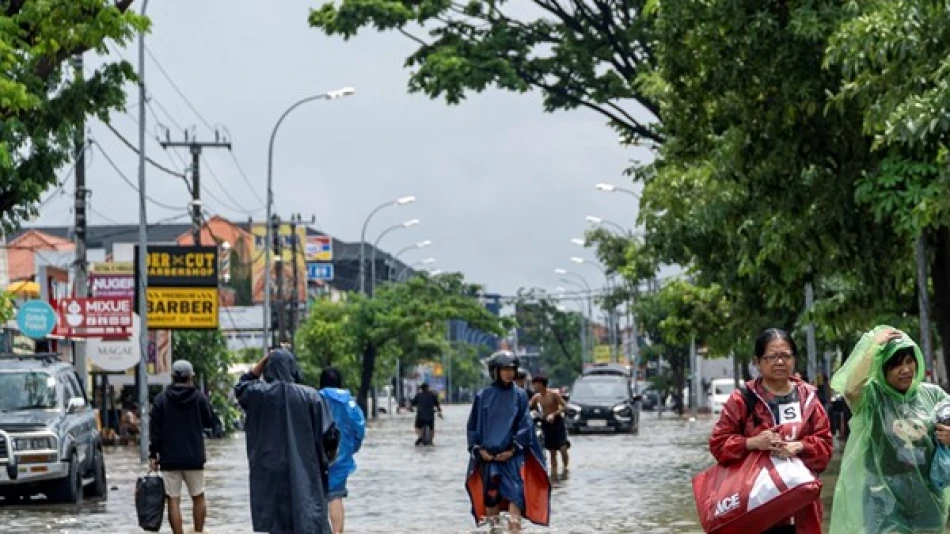
Deadly Landslides and Floods Ravage Indonesian Provinces, Leaving Fatalities and Missing Persons
Indonesia's Tourism Paradise Hit by Deadly Flash Floods as Climate Risks Mount
At least 15 people have died and 10 remain missing after sudden flash floods devastated two Indonesian provinces, including the critical tourism hub of Bali, highlighting the archipelago's growing vulnerability to extreme weather events that threaten both lives and economic stability.
Bali Bears the Brunt of Devastating Floods
Heavy rains that began Monday triggered widespread flooding and landslides across East Nusa Tenggara province and the internationally renowned tourist destination of Bali. The island paradise, which attracts millions of visitors annually and contributes significantly to Indonesia's foreign exchange earnings, saw eight confirmed deaths with eight people still unaccounted for.
The flooding transformed Bali's landscape into a disaster zone, with torrential waters sweeping through nine cities and districts. Muddy torrents carrying rocks and trees devastated mountain villages, while at least 112 residential neighborhoods disappeared under floodwaters. Multiple landslides compounded the destruction across the island.
Tourist Infrastructure Under Siege
The floods struck both residential areas and tourist sites, forcing authorities to cut electricity and water supplies as a safety measure. Video footage released by Indonesia's National Search and Rescue Agency showed cars floating in muddy waters while soldiers and paramedics used rubber boats to evacuate children and elderly residents from rooftops of submerged buildings.
In South Denpasar's Kumbasari market area, four people were trapped inside a building that collapsed and was swept away by floodwaters, according to Neuman Sedakaria, head of Bali's Search and Rescue Agency.
A Pattern of Increasing Climate Vulnerability
This latest disaster underscores Indonesia's position as one of the world's most climate-vulnerable nations. The archipelago of over 17,000 islands regularly experiences flooding during its rainy season, but the intensity and unpredictability of such events have increased in recent years.
Unlike developed nations that have invested heavily in flood management infrastructure, Indonesia's rapid urbanization often outpaces drainage system development. Cities like Bangkok and Manila face similar challenges, but Indonesia's vast geographic spread makes coordinated disaster response particularly complex.
Economic Implications Beyond Tourism
For Indonesia's economy, Bali represents far more than a tourist destination—it's a critical revenue generator that helps balance the country's current account. The province typically welcomes over 6 million international visitors annually, contributing billions to GDP. Severe weather events that damage infrastructure and create safety concerns can have lasting impacts on visitor confidence.
The timing proves particularly concerning as Indonesia, like many Southeast Asian nations, seeks to rebuild its tourism sector following the COVID-19 pandemic. Climate-related disasters add another layer of uncertainty for an industry already grappling with changing travel patterns and economic headwinds.
Broader Regional Climate Challenges
Indonesia's flood crisis reflects a wider regional pattern. Countries across Southeast Asia—from the Philippines to Vietnam—face increasing extreme weather events linked to climate change. However, Indonesia's unique geography as an island nation with significant coastal populations makes it especially vulnerable to both flooding and sea-level rise.
The disaster also highlights infrastructure gaps that persist despite Indonesia's economic growth over recent decades. While the country has invested in disaster response capabilities, prevention through improved urban planning and flood management systems remains inconsistent across its vast territory.
The human cost of this latest flooding—combined with its impact on critical economic infrastructure—serves as another reminder that climate adaptation isn't just an environmental issue for Indonesia, but an urgent economic and security priority.
Most Viewed News

 Layla Al Mansoori
Layla Al Mansoori






